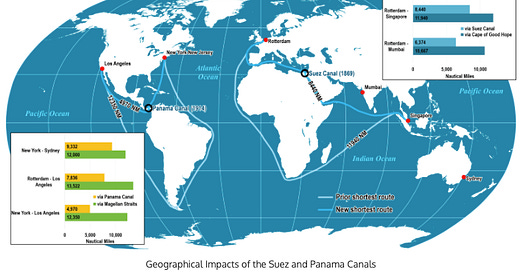Again, total disclaimer that I am coming from an American background, and the facts may well be prejudiced in ways I am unaware of.
What was the Suez Crisis and how did it change international relations?
The Suez Canal before 1952
The Suez Canal was built in Egypt by a French consortium. At the time Egypt was a self-ruling territory of the Ottoman Empire. It was built in 1869 quickly became a boon to trade throughout Europe. It was particularly important to Britain as it provided quick passage to British India, cutting the sea passage by half.
In 1875 less than a decade later, the Egyptian government was unable to pay back the investors in the canal and sold the Egyptian 44% share of ownership to Britain. Unrest in Egypt seemed to threaten British interest and the country invaded Egypt in 1882. Britain took fully control over the area although it was still, technically, part of the Ottoman Empire. This relationship continued until World War I, when Britain officially took over a short-term protectorate and later the country became a defacto British colony. The Suez Canal Zone was placed under British rule by the 1936 Anglo-Egyptian Treaty. Not only the canal, but a strip of land on both sides was controlled by Britain and France - much like the Panama Canal Zone was managed by the United States.
Ignoring years of low level conflict, the next major change in the region occurred in 1952. The Egyptian Revolution occurred in 1952 and Adbul Nasser came to power. He would run the country in a few positions of power until 1970. Egyptians took control of the country but the British retained control of the Suez Canal. Both the US and the USSR pushed Britain to turn control over the canal to Egypt, but they refused. They worried that Egypt could not manage the canal and their access to Asia (and their colonies) might be cut off.
The Cause of the Crisis
Abdul Nasser Egypt originally tried to craft a path between the two cold war antagonists, the Soviet Union and the United States. The impact of the superpower rivalry inside Egypt was a key cause of the Suez Crisis, albeit as an unintended consequence.
Nasser desired to build a new dam on the Nile, the Aswan High Dam. The benefits were widely sold and one of the reasons for Egyptian revolution began. Post-revolution Egypt approached both the Soviet Union and United States to help pay for the dam. The United States originally agreed to support the dam construction along with the Soviet Union. But superpowers tensions caused the United States to abandon its commitment.
In response, Egypt nationalized the Suez Canal, with the explanation that fees would help pay for the high dam.
The other justification internally used for taking control of the Suez Canal Territory was to demonstrate that Egypt would not be controlled by France and England. Furthermore Britain and France’s control of the strip inhibited Egyptian response to Israeli attacks in the Gaza Strip.
Military Action
In July of 1956 Nasser nationalized the Suez Canal, froze the assets of the Suez Canal Company and promised to pay the shareholders the price of the shares according to the closing price on the Paris Stock Exchange. At the same time Nasser prohibited Israeli use of the canal and blockaded the Israeli access to the Red Sea via closing access via the Straits of Tiran.
The military back and forth details are not critical to understanding what happened, but the players are important. We now know that original plans for an attack were drawn up after Egypt seized the canal. Israel swept through and conquered the Egypt’s Sinai Peninsula. France and England both landed forces in the canal zone.
But all forces spent months after nationalization trying to find a peaceful solution or preparing for war. This meant that the military engagement did not start for months. Popular outrage in France and England that might have fully supported a war right after nationalization had turned into a passive acceptance by many in each nation.
The French, British and Israeli governments tried to bring the United States into the war on their side. But the United States in the 1950s was a promoter of independence for former colonies and refused to support their allies in this endeavor.
During the invasion the Soviet Union agreed to supply Egypt with more arms, and threatened the west with missile strikes if the Anglo-French-Israeli forces did not withdraw. At this point the United States offered a measured response, but still an antithetical response toward the invading countries, all United States allies. The US cautioned the Soviet forces to stay out of the situation. The US also demanded the invading forces leave the occupied territory or face US sanctions. This was a rare situation (at least in the 1950s) of the United States willingness to stand up to her allies. The countries involved agreed to a UN ceasefire that left Egypt with the Suez Canal and the Siani Peninsula, but guaranteed freedom of transit for all through the canal.
Subsequent intelligence has suggested that the United States’ institutions were particularly upset that Britain had not kept the US in the information loop prior to the invasion.
Aftermath
The political ramifications were ultimately more long lasting than the short conflict would suggest. The peace between Egypt and Israeli was short lived as the Six-day War started a decade later and closed the canal for another 10 years.
Politically. It was the demonstration of the new world order. The old world powers, France and Britain were displaced by the new world powers, the Soviet Union and the United States. The Suez Crisis answered most of questions about this change. Including the lengths both powers would go to in order to protect their strategic interests.



